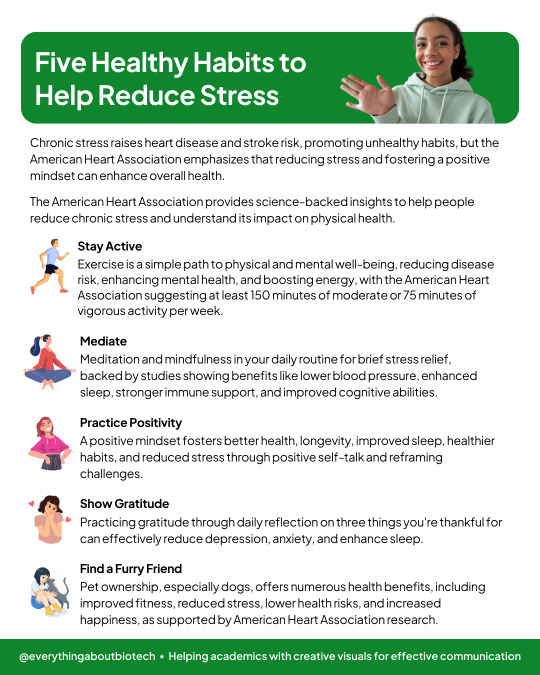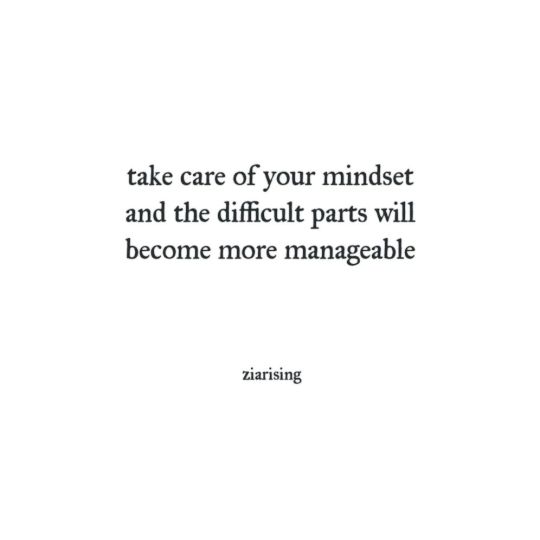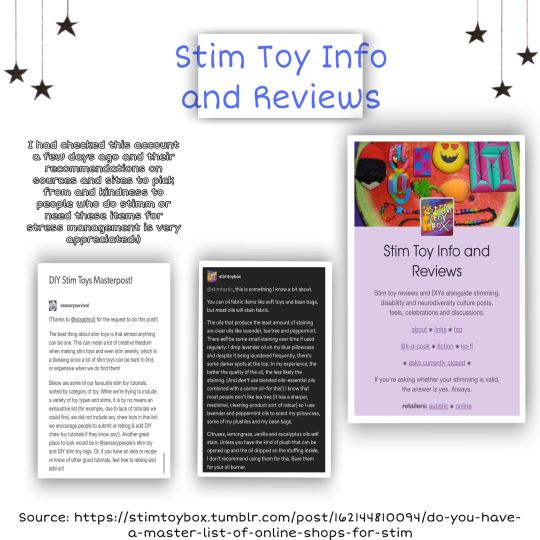#CopingStrategies
Text

5 Healthy Habits to Help Reduce Stress 🤗
Chronic stress raises heart disease and stroke risk, promoting unhealthy habits, but the American Heart Association emphasizes that reducing stress and fostering a positive mindset can enhance overall health.
The American Heart Association provides science-backed insights to help people reduce chronic stress and understand its impact on physical health.
Stay Active
Exercise is a simple path to physical and mental well-being, reducing disease risk, enhancing mental health, and boosting energy, with the American Heart Association suggesting at least 150 minutes of moderate or 75 minutes of vigorous activity per week.
Mediate
Meditation and mindfulness in your daily routine for brief stress relief, backed by studies showing benefits like lower blood pressure, enhanced sleep, stronger immune support, and improved cognitive abilities.
Practice Positivity
A positive mindset fosters better health, longevity, improved sleep, healthier habits, and reduced stress through positive self-talk and reframing challenges.
Show Gratitude
Practicing gratitude through daily reflection on three things you're thankful for can effectively reduce depression, anxiety, and enhance sleep.
Find a Furry Friend
Pet ownership, especially dogs, offers numerous health benefits, including improved fitness, reduced stress, lower health risks, and increased happiness, as supported by American Heart Association research.
#MentalHealth#MentalHealthMatters#EndTheStigma#Wellness#SelfCare#Mindfulness#Anxiety#Depression#MentalHealthAwareness#YouAreNotAlone#MentalHealthSupport#SelfLove#PositiveMentalHealth#Therapy#CopingStrategies
12 notes
·
View notes
Text
Day 1
Today marks the beginning of a new chapter in my life, one where I find myself not heading to work. Just last Friday, I received the news that I had lost my job. In the aftermath, there were a few days of confusion, a jumble of emotions swirling within me. I couldn't quite tell if I was harboring resentment or seething with anger. People suggested I should try to box up these feelings, so that's exactly what I'm attempting to do.
This isn't the first time I've faced such a situation. The last time it happened, I spiraled into a deep depression. Fortunately, I sought help and received the support I needed. It took me about two weeks to rediscover the secret of getting back on track.
Now, I find myself at a crossroads once again. Should I dive right into job hunting, or should I take a moment to revisit my past experiences? Perhaps there are valuable lessons waiting to be learned from my previous job loss.
Honestly, right now, I'm lacking the energy for either option. What I really feel like doing is some retail therapy, indulging in a bit of shopping.
I'm at a loss, uncertain about what my next steps should be. If anyone has been through a similar situation, I could use some guidance. HELP!!!
#JobLossJourney#FreshStart#CareerTransition#EmotionalResilience#JobHunting#SelfDiscovery#PersonalGrowth#LifeAfterJobLoss#OvercomingChallenges#JobSearchTips#JobLossRecovery#NewBeginnings#SelfReflection#JobSeekers#CopingStrategies#MentalHealthMatters#SupportNetwork#NavigatingChange#BloggersLife#help
5 notes
·
View notes
Text
youtube
How to overcome anxiety and depression \ 10 Tips for overcome anxiety and depression
#pyschology#anxitey#anxi4ty#depressing shit#mental health#Depression#SelfCare#Wellness#MentalHealthMatters#Mindfulness#SelfHelp#PositiveThinking#CopingStrategies#Healing#MentalWellness#Therapy#Support#EmotionalHealth#SelfImprovement#MentalHealthAwareness#OvercomingChallenges#YouAreNotAlone#Wellbeing#Youtube
2 notes
·
View notes
Photo

#mindsetquotes #mindsetmotivation #reallife #igwriters #writersofengland #writersquotes #lifeskills #lifequotestoliveby #reminder #selfempowerment #peopleempoweringpeople #womenempoweringwomen #lifestylechanges #lifecoaching #lifestylegoals #mindfocus #mindfulness #livebetter #copingstrategies #coping https://www.instagram.com/p/CoNt4FDK9lb/?igshid=NGJjMDIxMWI=
#mindsetquotes#mindsetmotivation#reallife#igwriters#writersofengland#writersquotes#lifeskills#lifequotestoliveby#reminder#selfempowerment#peopleempoweringpeople#womenempoweringwomen#lifestylechanges#lifecoaching#lifestylegoals#mindfocus#mindfulness#livebetter#copingstrategies#coping
7 notes
·
View notes
Photo

Noooooo, honestly, I’m fine! Just fine! Totally just compartmentalizing entire healthily. And doing shots of Sriracha straight from the bottle. Like you do when you’re fine. #sriracha #transwoman #copingstrategies #hotsaucelover #srirachalover #hotsauce #funny #activist #selfcare https://www.instagram.com/p/CfiAujVsYXE/?igshid=NGJjMDIxMWI=
3 notes
·
View notes
Text
Decoding One-Sided Relationships: Unveiling Signs, Causes, and Solutions

In the intricate dance of relationships, sometimes the steps become uneven, leading to a scenario where one partner carries a heavier burden than the other.
This phenomenon, often termed as a "One-Sided Relationship," can manifest in various forms, affecting individuals emotionally, mentally, and even physically.
In this article, we'll delve into the nuances of one-sided relationships, exploring the signs, effects, causes, and strategies for coping with this imbalance.
What is a One Sided Relationship?
In its essence, a one-sided relationship denotes an imbalance where one partner invests significantly more energy, time, or resources compared to the other.
This imbalance can permeate various facets of the relationship, be it emotional support, decision-making, or shared responsibilities.
Often, one partner finds themselves giving endlessly, while the reciprocity remains elusive, leading to feelings of disillusionment and discontent.

Signs of a One-Sided Relationship:
Recognizing the signs of a one-sided relationship is paramount for initiating change. Some common indicators include:
- Initiating the majority of communication and activities.
- Bearing the weight of major relationship decisions alone.
- Frequently being the one to apologize or make amends after conflicts.
- Sacrificing personal needs and desires to maintain the relationship.
- Feeling insecure and uncertain about the partner's commitment and intentions.
- Experiencing poor communication and feeling unheard or undervalued.
These signs often reflect an unequal distribution of effort and investment within the relationship, fostering feelings of resentment and inadequacy in the giving partner.
Causes of One-Sided Relationships:
Understanding the root causes of one-sided relationships sheds light on the underlying dynamics. Several factors contribute to this imbalance, including:
- Poor communication skills hindering the expression of needs and expectations.
- Individual insecurities leading to overcompensation and fear of abandonment.
- Conflicting relationship expectations and differing levels of commitment.
- Personal issues such as mental health struggles affecting one partner's ability to contribute.
- Attachment styles influencing behaviors and emotional dependency.
- Passive-aggressive behaviors perpetuating imbalance and resentment.
Identifying these causes can pave the way for introspection and constructive dialogue within the relationship.
Effects of One-Sided Relationships:
The ramifications of a one-sided relationship extend beyond emotional distress, encompassing various detrimental effects:
- Increased stress stemming from the burden of imbalance and unmet needs.
- Feelings of loneliness and isolation due to lack of genuine connection.
- Diminished self-esteem resulting from continuous disappointment and rejection.
Acknowledging these effects underscores the urgency of addressing the imbalance and seeking resolution.
Strategies for Addressing One-Sided Relationships:
Effectively navigating a one-sided relationship requires concerted effort and mutual commitment. Here are some actionable strategies:
- Communicate Your Needs: Initiate honest conversations about feelings, needs, and boundaries within the relationship.
- Assess and Adjust Behaviors: Evaluate contributions to the relationship and strive for equitable distribution of responsibilities.
- Consider Couples Therapy: Seek professional guidance to enhance communication, address underlying issues, and foster mutual understanding.
- Know When to End Things: Recognize when efforts to restore balance prove futile and prioritize your well-being by considering ending the relationship.

Can a relationship work if it's one-sided?
Being in a one-sided relationship feels like continuously pouring your heart and soul into something that never fills up.
You hope against hope that things will change, that your efforts will be recognized and reciprocated.
But deep down, you know the truth: a one-sided relationship is like trying to build a house on shifting sands.
No matter how hard you try, the foundation is inherently flawed. Sure, you might patch things up temporarily, but without mutual commitment and effort, it's destined to crumble.
So, can a one-sided relationship work?
Perhaps momentarily, but sustaining it long-term? Unlikely.
Because love, at its core, is about balance, reciprocity, and shared growth.
Anything less is just a facade of what a real relationship should be.
What is an unbalanced relationship?
Picture this: you're walking a tightrope, balancing precariously with every step. That's what it feels like to be in an unbalanced relationship.
One person carries the weight of the world on their shoulders while the other floats by, oblivious to the strain.
It's like trying to dance with a partner who's always a step behind or a step ahead, never in sync.
An unbalanced relationship is a seesaw stuck in perpetual imbalance, where one side is always higher, leaving the other perpetually grounded.
It's a constant battle against the forces of gravity, trying desperately to find equilibrium but always teetering on the edge of collapse.
How do you deal with a one-sided breakup?
Dealing with a one-sided breakup is like navigating a stormy sea with no lighthouse in sight.
It's a whirlwind of emotions, from heartbreak to relief, as you finally break free from the chains of an unequal bond.
The first step is to grieve, to mourn the loss of what could have been and the realization of what never was.
Allow yourself to feel the pain, the anger, the sadness, and let it wash over you like waves crashing against the shore.
But remember, you are not alone.
Reach out to loved ones for support, lean on them as you navigate this turbulent time.
And above all, be gentle with yourself. Healing takes time, patience, and self-compassion.
But with each passing day, you'll emerge stronger, wiser, and ready to embrace a future filled with love, balance, and reciprocity.
Self-Reflection and Self-Care:
Amidst the turmoil of a one-sided relationship, prioritizing self-reflection and self-care is imperative.
Encourage readers to introspectively examine their own needs, desires, and boundaries.
Emphasize the importance of self-compassion and nurturing oneself emotionally and physically.
Suggest activities such as journaling, mindfulness practices, and engaging in hobbies that promote self-discovery and inner peace.
Tips for Starting Difficult Conversations:
1. Choose the Right Time and Place:
- Timing is crucial when initiating a difficult conversation in a one-sided relationship. Select a moment when both partners are calm and receptive, ideally in a private setting free from distractions. By setting the stage for open communication, you enhance the likelihood of a constructive dialogue.
2. Express Your Feelings Clearly:
- Begin the conversation by expressing your emotions using "I" statements to avoid placing blame or provoking defensiveness. Share how you've been feeling in the relationship, highlighting specific instances of imbalance or unmet needs. Being honest and transparent sets the tone for authentic communication.
3. Use Active Listening Techniques:
- Practice active listening throughout the conversation, demonstrating empathy and understanding towards your partner's perspective. Encourage them to express their thoughts and feelings without interruption, validating their experiences and emotions. Reflect back what you've heard to ensure mutual comprehension and respect.
4. Focus on Solutions, Not Blame:
- Approach the conversation with a collaborative mindset, focusing on finding solutions rather than assigning blame. Brainstorm together to identify practical steps for addressing the imbalance in the relationship and fostering greater reciprocity. Emphasize the importance of mutual commitment to positive change.
5. Remain Calm and Respectful:
- Maintain a calm and respectful demeanor during the conversation, even if emotions run high. Avoid escalating conflicts or resorting to personal attacks, instead prioritizing constructive dialogue and mutual understanding. Take breaks if needed to regroup and regain composure before continuing the discussion.
6. Set Realistic Expectations:
- Be prepared for the conversation to unfold unpredictably, with emotions fluctuating and perspectives evolving. Set realistic expectations for progress, acknowledging that meaningful change takes time and effort from both partners. Focus on incremental steps towards greater balance and harmony in the relationship.
7. Seek Professional Support if Needed:
- If navigating difficult conversations feels overwhelming or unproductive, consider seeking guidance from a couples therapist or relationship counselor. A trained professional can provide valuable insights, communication tools, and support tailored to your unique circumstances, facilitating meaningful progress and healing.

Seeking Support:
Navigating a one-sided relationship can feel isolating, but readers should be reminded that they are not alone.
Encourage them to reach out to trusted friends, family members, or mental health professionals for support and guidance.
Provide resources for finding therapists or support groups specializing in relationship dynamics.
Highlight the value of sharing experiences and receiving validation from others who understand their struggles.
Setting and Enforcing Boundaries:
Empower readers to establish clear boundaries within their relationships, articulating their needs and expectations with assertiveness and confidence.
Offer practical tips for communicating boundaries effectively and enforcing them with consistency.
Stress the importance of prioritizing self-respect and honoring personal limits, even if it means setting boundaries that may be uncomfortable or challenging.
Developing Coping Strategies:
Equip readers with coping mechanisms to navigate the emotional challenges of a one-sided relationship.
Encourage them to explore healthy coping strategies such as mindfulness meditation, expressive arts therapy, or physical exercise.
Provide suggestions for building resilience and managing stress in constructive ways, emphasizing the importance of self-care practices that promote emotional well-being.
Long-Term Relationship Maintenance:
Navigating a one-sided relationship over the long term presents unique challenges, requiring ongoing effort and adaptation to sustain the partnership. Despite the inherent imbalance, implementing proactive strategies can foster mutual growth and resilience.
1. Open Communication Channels:
- Foster open and honest communication channels to address concerns, express needs, and negotiate boundaries collaboratively. Encourage regular check-ins to ensure both partners feel heard and valued in the relationship.
2. Cultivate Empathy and Understanding:
- Foster empathy and understanding towards each other's perspectives and experiences. Take the time to listen actively, validate emotions, and demonstrate empathy towards your partner's feelings and needs.
3. Prioritize Mutual Growth:
- Prioritize mutual growth and development within the relationship, setting shared goals and aspirations that align with both partners' values and ambitions. Encourage each other's personal and professional endeavors, celebrating achievements together.
4. Flexibility and Adaptability:
- Remain flexible and adaptable in navigating the evolving dynamics of the relationship. Recognize that needs and circumstances may change over time, requiring ongoing adjustment and compromise to maintain equilibrium.
5. Equal Distribution of Responsibilities:
- Strive for an equal distribution of responsibilities and contributions within the relationship, ensuring both partners share the workload and invest effort proportionally. Avoid falling into patterns of over-giving or over-receiving, promoting a balanced partnership.
6. Regular Relationship Check-Ins:
- Schedule regular relationship check-ins to assess satisfaction, address concerns, and reinforce mutual commitment. Use these check-ins as an opportunity to realign priorities, identify areas for improvement, and celebrate shared successes.
7. Seek Professional Support:
- Don't hesitate to seek professional support from couples therapists or relationship counselors when facing challenges or impasses in the relationship. Professional guidance can offer valuable insights, communication strategies, and conflict resolution techniques tailored to your unique dynamics.
8. Practice Gratitude and Appreciation:
- Cultivate a culture of gratitude and appreciation within the relationship, acknowledging each other's efforts, strengths, and contributions regularly. Expressing gratitude fosters mutual respect and strengthens the emotional bond between partners.
9. Foster Emotional Resilience:
- Prioritize emotional resilience and self-care practices to navigate the inevitable ups and downs of a one-sided relationship. Develop coping mechanisms to manage stress, build resilience, and cultivate inner strength amidst challenges.
10. Reassess Relationship Dynamics:
- Periodically reassess the dynamics of the relationship to ensure it remains healthy, fulfilling, and aligned with both partners' needs and aspirations. Be willing to address imbalances or issues as they arise, proactively seeking solutions to promote mutual satisfaction.

Planning for the Future:
Encourage readers to envision a future that aligns with their values, aspirations, and goals, independent of their current relationship dynamics.
Emphasize the significance of personal growth and self-fulfillment, regardless of whether the relationship continues or ends.
Guide them in setting achievable goals and taking proactive steps towards creating a fulfilling life that reflects their true desires and potential.
In the intricate tapestry of relationships, achieving equilibrium is crucial for fostering mutual fulfillment and growth.
While one-sided relationships pose significant challenges, they also present opportunities for introspection, communication, and ultimately, transformation.
By recognizing the signs, understanding the causes, and implementing effective strategies, individuals can navigate the complexities of one-sided relationships with resilience and grace.
Remember, your worth is not defined by the efforts you invest in a relationship; it lies in your capacity to cultivate relationships that honor and uplift you.
Read the full article
#CommunicationIssues#CopingStrategies#emotionalstrain#Long-TermMaintenance#MutualFulfillment#One-SidedRelationships#relationshipdynamics#ResilienceBuilding#Self-reflection#SignsofImbalance
0 notes
Text
Personality and Cognitive Quotients: Insights from Psychology
Introduction
The relationship between personality traits and mental abilities has been a central theme in psychology, offering understanding into how individual differences affect behavior and performance. Traditionally, intelligence was narrowly defined as the ability to reason logically, plan systematically, and solve problems quickly – typically measured by IQ tests. Multiple Intelligences Theory by Howard Gardner enlarged this notion by suggesting that there are many types of intelligences such as linguistic, logical-mathematical, spatial, musical, bodily-kinesthetic, interpersonal intrapersonal and naturalistic intelligences among others. This broader perspective points out that intellect is not one thing but a multitude of skills indicative of diverse ways people interact with their environment; thus far research has continued to dwell on these issues as well as relationships between Big Five Personality Traits namely Openness Conscientiousness Extraversion Agreeableness Neuroticism with different dimensions of intelligence also social functioning.
Openness to Experience and Curiosity Quotients
Closely related to openness is curiosity which can be measured using Curiosity Quotient (CQ) that describes an individual’s thirst for information or desire for novelty. According to von Stumm et al., (2011), intellectual curiosity – a major component of Openness has been found to significantly contribute towards academic achievement even beyond traditional cognitive abilities. Such curiosity encourages learners’ deep involvement with content leading higher level cognitive investments while at the same time enhancing creative problem solving skills. In other words it implies those who are open minded not only accept new ideas but also tend explore them more thereby widening their knowledge base and improving various aspects of thinking.This finding suggests therefore that fostering curiosity should be seen as strategy for promoting intellectual growth hence educational institutions should create environments which nurture investigative learning through asking questions.
Agreeableness Social Intelligence (EQ)
Agreeableness is characterized by empathy cooperation trust etc., all these traits have strong relationships with Emotional Intelligence (EQ). For instance Nusbaum and Zuroff (2017) conducted a meta-analysis which showed that higher levels of agreeableness were associated with greater emotional awareness as well better interpersonal skills. This implies that individuals who score highly on Agreeableness are more likely to be good at reading other people’s moods while also being skilled in dealing with them appropriately within social settings – thus this ability may help one succeed both personally professionally. Additionally having such an attribute means being able to understand others’ emotions easily hence it enhances communication abilities thereby promoting conflict resolution.
Research Associations Between Neuroticism, Stress, and Agreeableness
Neuroticism is strongly correlated with stress sensitivity where many studies have shown that people high in neuroticism tend perceive daily events or situations more stressful than those low in neurosis. Moreover, it has been observed that individuals scoring at extreme ends of this trait dimension exhibit different patterns coping style when faced by same stressors; indeed high scorers often respond through negative affectivity such anxiety fear sadness etc., whereas their counterparts express positive feelings like joy excitement happiness. Furthermore apart from heightened reactivity towards negative aspects life due inability regulate emotions properly these individuals also take longer recover from adverse experiences resulting prolonged periods characterized by increased anxiousness along with further maladaptive behaviors aimed reducing stress levels.Research has established close relationship between these two variables so much so
On the other hand, EQ usually correlates negatively with neuroticism. Emotional regulation and awareness necessary for EQ are often compromised at higher levels of Neuroticism. People with high neurotic symptoms may find it difficult to understand or manage their own feelings as well as misinterpret others’ emotional signals hence affecting their social interactions adversely.
Neuroticism and Agreeableness integrated within EQ
It should be noted that when both agreeableness and neuroticism are considered along with each other in relation to emotional intelligence (EI); there can be complex interactions between these two personality traits towards EI. For example; an individual who is highly agreeable as well as very neurotic might have empathy skills on one hand but also fear evaluations or conflicts arising from such relationships due to extreme worry about them being maintained harmoniously thus creating mixed self management abilities where this person has good interpersonal skills but lacks stress coping strategies.
Conclusion
In conclusion, while it is true that agreeableness positively correlates with Emotional Intelligence (EQ) leading better understanding of others’ emotions and more improved relationship building; generally neurosis undermines this concept by making regulation process too complicated thereby impeding ability to cope up with stress among individuals having different levels of these traits. Such understandings are important because they help people design interventions which maximize benefits derived from being highly agreeable while minimizing negative impacts associated with high levels of Neuroticism in various areas like personal growth or professional development programs.However, combination does not always equal so; therefore we should know that there is no neat equation between them but rather a significant interplay between these components which greatly shapes individual’s emotional intelligence profile.
The study into how personality affects cognitive ability measures provides us with insights about human behaviour and potentiality. Such understanding enables educators come up personalized educational plans which cater for diverse personalities alongside intellectual capabilities. By recognizing strengths inherent within each personality type employers can create an environment conducive for optimal job performance while fostering good relations among employees. Ultimately this knowledge equips people to devise more inclusive strategies aimed at personal growth both at social dimensions such as friendship building or self awareness levels.Thus it can be said that the interrelationship between personality and intelligence is critical in our quest for success.
References:
Brackett, M. A., & Mayer, J. D. (2003). Convergent, discriminant, and incremental validity of competing measures of emotional intelligence. Personality and Social Psychology Bulletin, 29(9), 1147-1158. https://doi.org/10.1177/0146167203254596
Fernández-Berrocal, P., & Extremera, N. (2006). Emotional intelligence: A theoretical and empirical review of its first 15 years of history. Psicothema, 18, 7-12. http://www.psicothema.com/pdf/3271.pdf
Lahey, B.B. (2009). Public health significance of neuroticism.American Psychologist,64(4),241-242.doi:10.1037/a0015309
Lopes,P.N., Salovey,P.,Côté,S.,& Beers,M.(2005).Emotion regulation abilities and the quality of social interaction .Emotion ,5(1),113-118.doi:10.1037/1528-3542.5.1.113
Mikolajczak,M., Luminet,O., Leroy,C., & Roy,E.(2007).Psychometric properties of the Trait Emotional Intelligence Questionnaire:Factor structure,reliability construct,and incremental validity in a French-speaking population.Journal of Personality Assessment ,88(3),338-353.doi:10..1080/00223890701333431
Nusbaum,E.C.& Zuroff,D.C.(2017)Relations of the five-factor model of personality with perceived and actual emotional intelligence: A meta-analysis.Personality and Individual Differences,106,223-229.doi:10.1016/j.paid.2016.10.044
Suls,J.,& Martin,R.(2005).The daily life of the garden-variety neurotic: Reactivity, stressor exposure,mood spillover,and maladaptive coping.Journal of Personality ,73(6),1485-1510.doi:10.1111/j.1467-6494.2005.00356.x
von Stumm, S., Hell, B., & Chamorro-Premuzic, T. (2011). The hungry mind:intellectual curiosity is the third pillar of academic performance.Perspectives on Psychological Science , 6(6),574-588.doi:10.1177/1745691611421204

#PsychCommunity#PsychoEducation#MentalHealthAwareness#PsychologyResearch#EvidenceBased#StressManagement#CopingStrategies#MentalWellness#EQ`#`EmotionRegulation`#SocialSkills`#self awareness#Extraversion#Openness#Neuroticism#Agreeableness#Conscientiousness#big 5#PersonalityTraits
0 notes
Text
Embracing Stress: A Guide to Turning Worry into Wonder
Unlock your potential with our stress-busting tips! Discover mindfulness, resilience, and positivity strategies for a happier you. #StressManagement #PersonalGrowth #Mindfulness
Hey there, fellow traveler on the rollercoaster of life! Today, we’re diving deep into the realms of stress and worry. Yes, you read that right — we’re going to tackle those seemingly daunting monsters that love to crash our party uninvited.
Photo by cottonbro studio on Pexels.com
But fear not, because we’re going to learn how to not just deal with them, but also harness their power to propel…

View On WordPress
#AnxietyManagement#CopingStrategies#EmotionalResilience#EmotionalWellness#growthmindset#HappinessHabits#HealthyMindset#LifeSkills#MentalHealth#MentalHealthAwareness#MindBodyConnection#mindfulness#MindfulnessMeditation#MindfulnessPractices#PersonalDevelopment#PositivePsychology#PositiveThinking#ProductivityHacks#ResilienceBuilding#SelfAwareness#SelfCare#SelfDiscovery#SelfImprovement#StressManagement#StressManagementTipsCopingStrategies#StressRelief#WellbeingTips#Wellness#WellnessJourney#adventure
0 notes
Text
Unlocking Creativity: Exploring Morning Rituals for Productivity
What are your morning rituals? What does the first hour of your day look like?
By: SoDakArtist
Embarking on the journey of creativity often begins with the rituals of dawn. As the sun stretches its golden fingers over the horizon, many artists, like myself, find solace and inspiration in the tranquility of the morning hours. Here’s a glimpse into my morning rituals, where the canvas of…
View On WordPress
#AbstractArt#ArtInspiration#artislife#artistexpression#ArtisticBeauty#ArtisticCreativity#ArtisticEnergy#ArtisticExpression ArtisticMasterpiece#ArtisticJourney#ArtisticSoul#ArtisticStyle#ArtisticVision#ArtisticWisdom#Awakening#BeyondTime#Blogs#ConnectionsMatter#ContemporaryArt#CopingStrategies#CreativeExpression#Creativity#CreativityUnleashed#dailyart#DivineConsciousness#DivineEnergy#DivineUnion#DreamBig#Empowerment#Enlightenment#ExploreTogether
0 notes
Text
Anxiety Attacks Happen
Anxiety attacks occur without always displaying a trigger; moreover, triggerless attacks often instill the most fear in people. Earlier this week, I experienced a triggerless anxiety attack, which might have been one of the worst days I’ve had in a very long time. Fortunately, my wife assisted me with the relaxation techniques I teach everyone. This anxiety attack came unexpectedly, with no…

View On WordPress
#AnxietyAwareness#CopingStrategies#FocusedBreathing#Journaling#MedicationCaution#MentalHealth#MilitaryAwareness#Prayer#Air Force#American#American soldiers#Anxiety#anxiety attacks#Army#benefit#Breathe#focus#freedomsystem.org#Marines#Navy#panic attacks#TBI#trauma#Veterans
0 notes
Text



~
Figdet toys are a very helpful thing to manage your anxiety. Or even when you're just nervous! My friend has put research into a kind website where you can get cute & helpful stress toys!
#care#global#globalcare#stress#toy#stresstoy#fidget#fidgettoys#help#info#information#comofrt#copingstrategies#copingmechanisms#love#review#toyreview#Anxiety
0 notes
Text
Hidden Frustrations: Signs of Anger Issues in a Girl
Discover signs of anger issues in a girl and expert advice on adolescent girls' anger issues, including symptoms, coping tactics, and seeking assistance. Encourage girls' emotional well-being, which can help teen females manage their anger and create healthy relationships.
#AngerIssues#angermanagement#TeenageAnger#girlshealth#CopingStrategies#teenagers#mentalhealth#communication#EmotionalWellBeing#copingmechanisms#wellbeing#mentalhealthawareness#ParentingTips
0 notes
Text
Matthew Danchak Strategies for Coping with Mental Health Challenges

Mental health challenges affect millions of people worldwide, often causing significant distress and impairment in daily functioning. However, there are various strategies and techniques individuals can employ to cope effectively with these challenges. Matthew Danchak, a renowned mental health advocacy, has developed a comprehensive approach to addressing mental health issues. In this blog post, we will explore some of the key strategies recommended by Danchak for managing mental health challenges and promoting overall well-being.
Understanding Mental Health Challenges:
Before delving into coping strategies, it's essential to understand the nature of mental health challenges. Conditions such as anxiety, depression, bipolar disorder, and schizophrenia can have diverse symptoms and impact individuals differently. Additionally, factors like genetics, environment, and life experiences contribute to the development and exacerbation of these conditions.
Matthew Danchak Approach:
Matthew Danchak, a respected figure in the mental health community, emphasizes the importance of a holistic approach to mental well-being. His strategies focus on addressing the underlying causes of mental health challenges while promoting self-care and resilience.
Seek Professional Help
Danchak stresses the significance of seeking professional assistance when dealing with mental health issues. This may involve consulting therapists, counselors, or psychiatrists who can provide personalized treatment and support.
Practice Self-Care
Self-care plays a crucial role in maintaining mental well-being. Danchak recommends incorporating activities such as exercise, meditation, and hobbies into daily routines. These practices can reduce stress, improve mood, and enhance overall resilience.
Build Support Networks
Surrounding oneself with supportive individuals can provide invaluable emotional support during challenging times. Danchak advocates for cultivating strong relationships with friends, family members, and support groups who can offer understanding and encouragement.
Develop Coping Skills
Learning effective coping skills is essential for managing stress and navigating difficult emotions. Danchak suggests techniques such as mindfulness, deep breathing exercises, and cognitive-behavioral strategies to cope with negative thoughts and feelings.
Maintain Healthy Habits
Healthy lifestyle habits, including balanced nutrition, adequate sleep, and avoiding substance abuse, are fundamental for mental well-being. Danchak emphasizes the importance of prioritizing these habits to support overall health and resilience.
Stay Engaged and Active
Engaging in meaningful activities and setting achievable goals can provide a sense of purpose and fulfillment. Danchak encourages individuals to pursue interests, volunteer opportunities, or educational pursuits that bring joy and satisfaction.
Monitor and Manage Symptoms
Regularly monitoring mental health symptoms and seeking adjustments to treatment plans as needed is crucial for long-term management. Matthew Danchak advises individuals to communicate openly with healthcare providers and advocate for their needs.
Conclusion
Matthew Danchak's strategies for coping with mental health challenges offer valuable insights and practical guidance for individuals seeking to improve their well-being.
By adopting a holistic approach that addresses various aspects of mental health, including seeking professional help, practicing self-care, building support networks, and maintaining healthy habits, individuals can enhance their resilience and lead fulfilling lives despite the challenges they may face.
Remember, prioritizing mental health is an ongoing journey, and seeking support and implementing coping strategies can make a significant difference in one's overall quality of life.
#MentalHealthAwareness#SelfCare#CopingStrategies#MentalWellness#HolisticHealth#SupportNetworks#Resilience#HealthyHabits#Mindfulness#WellBeing#MatthewDanchak#MentalHealthTips#EndTheStigma#YouAreNotAlone#HealthyMindset#PositiveMentalAttitude#WellnessJourney#Empowerment#StrongerTogether#SeekHelp#StressManagement
0 notes
Link
5 Ways to Cope with Job Loss during an Economic Crisis
0 notes
Text
7 Strategies to Beat Career Stress: How to Cope with Uncertainty
#careeruncertainty #copingstrategies
0 notes
Text
Imposter Syndrome
Photo by Rishabh Dharmani
Previous articles I have written can come back to Imposter syndrome. My article on mental health looked at men’s stubbornness when it comes to admission of needing help. Then later we looked at a modern trend of “fake it till you make it”, which is covered again later in this article.
So, as I have said before, I am not a mental health professional but have been forced…

View On WordPress
#AchievingGoals#BuildingSelfBelief#CareerConfidence#ConfidenceBuilding#CopingStrategies#DealingWithSelfDoubt#ImposterSyndrome#ImposterSyndromeAwareness#ImposterSyndromeTips#InnerCritics#MentalHealth#MindsetShift#OvercomingImposterSyndrome#PersonalGrowth#ProfessionalDevelopment#PsychologyOfSuccess#SelfEsteem#SelfReflection#SuccessMindset#WorkplaceAnxiety
0 notes